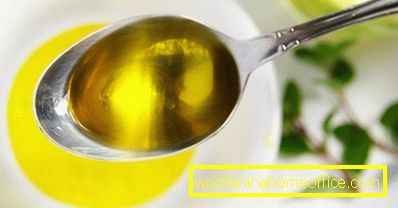Rapeseed oil
Vegetable oil is an amazing product with unique properties. Depending on the culture from which it is produced, it acquires certain organoleptic characteristics, nutritional value and scope of application. One of the widely used products is rapeseed oil. Far from everyone knows what they are doing it from - let's find out!
Production and taste

Determines the beneficial properties of rapeseed oil, what it is made of - cruciferous cruciferous seeds. This herb is a cabbage, an annual plant native to the Mediterranean, which appeared more than 6 thousand years ago. Its large flowers contain a lot of nectar (rape honey is widely known). The production of rapeseed oil is based on squeezing seeds.
The taste and aroma of this product are very specific, but quite pleasant, without harshness and bitterness, with distant nutty notes. In general, the taste of the oil from rapeseed resembles the squeeze of olives - that is why it is often called "northern olive". Another feature is that this vegetable fat does not lose its transparency and aroma brightness for a very long time, surpassing many other "colleagues" in these properties.
Application
Like olive oil, rapeseed oil is used primarily in the preparation of various dishes. Especially important is its use as a dressing for vegetable salads, as part of all kinds of light and high-calorie sauces for side dishes and meat. To add zest and increase the satiety of dishes, rapeseed oil is added to soups and main dishes, baked goods and marinades. But to fry on this product is not recommended: the beneficial properties of unrefined vegetable fat are reduced with strong heating.
In the food industry, this product is used in the manufacture of margarines and mayonnaise. In the pharmaceutical and cosmetics industry, it is also actively involved in the basics for creams, ointments, oil injections and regenerating agents for hair and skin.
Rapeseed oil is still used in some industries, including metallurgical, leather and textile. Some manufacturers of paints and household chemicals use it. And one more unexpected area of its "exploitation" - as an alternative source of fuel.
The benefits and harm of rapeseed oil

Like any vegetable fat, rapeseed oil is high in calories - more than 900 kcal per 100 g. Essential omega-3 and 6 polyunsaturated fatty acids, oleic acid and vitamin E make this product valuable for human health. This is an indispensable purchase for those who adhere to vegetarian food or observe fasting.
Omega-9 (oleic acid), which is very important for nails, hair and skin, is found in large quantities in rapeseed oil, which makes it a "magic drug" for beauty and youth.
Regular consumption of this product in food - prevention of diseases of the heart and blood vessels, because it helps strengthen the walls of veins and arteries, reduces arrhythmia. This is an effective means of preventing cancer.
As for vitamin E, then, like any other unrefined vegetable oil, rapeseed provides the daily rate of this substance by eating only one tablespoon during meals.
We should also mention the benefits of this product for women's health. Rapeseed oil contains hormone estradiol, which normalizes the cycle, making menstruation less painful.
Like any food product, rapeseed oil has not only useful properties, but also contraindications. There are a lot of rumors about his potential harm. However, in most cases, negative opinions on this topic are greatly exaggerated. Most often they are associated with the content of erucic acid in the product, which is not split in the body (due to the lack of special enzymes in it), as well as sulfuric compounds. With their excessive accumulation possible problems with the work of the digestive system, disruption of many organs.
But do not be afraid and refuse this product, because now it is produced from special breeding rapeseed varieties, in which erucic acid is contained in such a modest amount that it is not capable of causing even minimal harm to health (unless, of course, drinking it in liters). The same applies to sulfur compounds, which are contained in the technical, but are completely absent in edible rapeseed oil.
Today it is an absolutely safe product with beneficial properties that is recommended to be included in the diet of every woman. Contraindications are reduced only to:

- individual intolerance (it is extremely rare);
- tendency to upset stomach;
- severe liver disease;
- biliary dyskinesia.
And, of course, we must remember the measure: 2-3 tablespoons per day will be enough to keep the body in good shape and prevent possible harm.
Criteria for choosing a quality product
You can buy this product at a pharmacy or at a grocery supermarket. Ideal if you can order it directly in the farms. When buying in a store, you should pay attention to:
- oil color - it should be transparent, have an amber-yellow tint;
- sediment - in a quality product its presence is completely excluded;
- the content of erucic acid (must be written on the package) - must not exceed 0.6%;
- smell - he is supposed to be pleasant, not repulsive.
Store rapeseed oil better in the glass. Therefore, if you buy it in a store in a plastic bottle, pour it into a glass at home - this will retain its beneficial properties for a long time.
Rapeseed oil is an excellent product, its use in cooking is almost universal. And it is even more difficult to overestimate health benefits. Include it in your daily diet and observe how your well-being will change, how good you are with each day, your eyes fill up with shine, and your skin becomes more and more fresh and healthy.